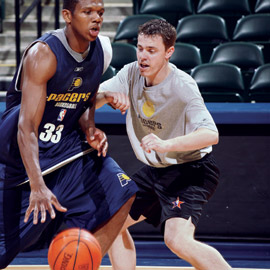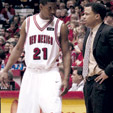 |


|
Summer 2004 | Volume 26, Number 7 | Features |
||||||
| Coaching Hoops For alumni Chad Forcierand Ritchie McKay, the game has become a profession. ONE REPORTER CALLED the Pistons-Pacers NBA playoff series in June “gritty.” Chad Forcier ’95, assistant coach for the Pacers, describes it as a “grind-it-out struggle.”
The profession of coaching can be similar: long hours and endless striving for the perfect season, all with the nagging knowledge that your job just might not be there tomorrow. On the other hand, when you least expect it, you’re intoxicated again with pure love for the game — in this case the game that Presbyterian minister James Naismith invented in 1891 and that has grown to become a worldwide industry. So what motivates someone to make a living on the basketball court, grooming professional or college players for wins and encouraging them after losses? Is there more to coaching than the pursuit of championships?The answer is yes for two Seattle Pacific University alumni: Forcier and Ritchie McKay ’87, who heads the men’s basketball program at the University of New Mexico. Although they took very different routes to their coaching careers, the two share an important quality, says Jeff Hironaka, men’s basketball coach at SPU. That quality is principled leadership. “The days of yelling and screaming as a coach are over,” explains Hironaka, who’s known McKay for many years and Forcier by reputation. “What counts is the ability to understand each individual and to get all of the individuals to bond as a team. As Christian coaches, we hope our walk and talk can impact the lives of our players. It’s how Ritchie and Chad act that is making a difference.” The Long-Shot “I was probably a complete nuisance to all those coaches because I was a basketball junkie starving to learn more about the game,” says Forcier. “I was asking questions of anyone that would give me a second — the head coach, the assistants, the trainer, the video coordinator. I always kept a pen and notebook and wrote down all the play diagrams and all the game plans. I saved copies of scouting reports and read everything I could.” Forcier pursued this entrepreneurial approach for five years with the Sonics. “Over time, my job evolved to the point where I became what Coach Karl described as a special assistant,” he recalls. “I ended up helping out the coaching staff and the players on the floor and at all pre-game workouts.” His efforts paid off. Today, although he never played college or NBA basketball, Forcier serves as an assistant coach for one of the league’s hottest teams, the Indiana Pacers. Indiana compiled the best regular-season record in the NBA this year, winning 61 games before losing to Detroit in the Eastern Conference finals. That Detroit ultimately became the 2004 NBA champions made the loss easier. “It’s always great to see the team that knocks you out of the race win it all,” he says. Forcier’s non-traditional path to the NBA went through Seattle Pacific. He landed the initial Sonics position with the help of SPU’s Student Employment Office. “Seattle Pacific is so highly respected in the business community of Seattle,” he says, “that it opens a lot of doors for students. Had I not been at SPU, and in a city like Seattle, I would never be where I am right now.” After his tenure with the Sonics, Forcier served as a varsity assistant and junior varsity coach at Lake Washington High School in Kirkland, Washington, and as an assistant coach at Oregon State University and the University of Portland. While at Oregon State, he volunteered to help at the highly regarded Pete Newell Big Man Camp in Honolulu. There he met Rick Carlisle, then an assistant coach with Indiana. When Carlisle was named head coach of the Detroit Pistons after the 2001 season, he hired Forcier as an assistant. When Detroit fired Carlisle in 2003, he was hired as Indiana’s head coach and took Forcier with him. “Most people don’t believe I’m an assistant coach in the NBA, because I’m 31 and I look 20,” says Forcier. “When they learn that I didn’t play in college or in the NBA, it becomes even harder to believe, and understandably.” Though his lack of college or professional playing experience makes him a minority among NBA coaches, Forcier says he feels respected by the players: “They quickly develop a sense for your feel for the game and whether you know what you’re doing — in the simplest of terms, whether you work hard and whether you’re working on their behalf.” Many former high school and college players still keep in touch with Forcier, which is testament to his influence. But influence, he says, is harder to measure in the NBA, where players are adult, independent men living in the high-stakes world that is professional athletics. Nevertheless, Forcier takes his position of leadership seriously and applies his Christian principles on the court as well as at home. “It’s something I’m conscious of,” he says. “I just try to look at different ways to sow the seed. Whether it’s landing on fertile ground or landing on rock, you just don’t know.” Forcier’s duties include watching film of the Pacers and their opponents to find an edge that will help the Pacers win. He also gives players information on opponents, and helps players in practice with shooting, ball handling and other skills. During the season, he often works seven days a week, sometimes 18–20 hours a day, with no free days to forget basketball. It can be difficult finding time for his wife, Kim Dalrymple Forcier ’92, and 14-month-old daughter, Ellie. “It’s a learning process,” he says. “I try to do as much of my job at home as possible, and Kim and Ellie attend all our home games. Ellie is already a basketball fan; her first legitimate word was ‘ball.’” Despite the workload, Forcier isn’t complaining. He knows how far he’s come in the profession since taking a part-time job with the Sonics to help pay for his SPU education: “That was not only a job, but also a long-shot chance to learn a little basketball, which could — who knows — maybe turn into something more.” It certainly did. The Purpose-Driven Life: Ritchie McKayThe fact that Ritchie McKay, head men’s basketball coach for the University of New Mexico Lobos still calls himself a Falcon is, at first, surprising. After all, being a UNM Lobo is practically in his genes. McKay was born and raised in New Mexico; his father was a noted basketball player for the NCAA Division I Lobos in the early 1960s; and when McKay was named UNM’s head coach in 2002, he declared, “To have a chance to coach at a place where I cheered, followed passionately and always wanted to play is quite a privilege.”Yet McKay’s roots at Seattle Pacific also run deep. He graduated from SPU in 1987 after three successful years on the Falcon basketball court. His record for steals — 10 in a single game — still stands, and he regularly follows Falcon men’s hoops. “I loved my playing experience at Seattle Pacific,” he recalls. “God knew I needed to be at SPU.” After high school, McKay attended an Arizona junior college, intending to transfer to a Division I school to play basketball. But he decided instead to transfer to a Christian university to find more support for his newfound Christian faith. Curious about the Pacific Northwest and armed with a catalog listing Division II schools, he wrote two Washington universities. Seattle Pacific replied, offering him a basketball scholarship. McKay’s talent on the court quickly impressed former SPU Coach Claude Terry, who started McKay in 26 games during his first year and in every game the next three years. Off the court, though, Terry was impressing McKay. The young man often saw his coach reading the Bible or writing in his journal. “Coach Terry and Professor Ken Leonard of the School of Business were men of great integrity,” McKay says. “They modeled it for me.” The lesson stuck. Even before graduation, McKay was unexpectedly steered into coaching. “When I was a senior, Coach Terry told me about a graduate assistantship at the UW,” he recalls, “and I got the position.” Not finished playing, though, he next headed to New Zealand, where he was a player-coach — and one of the league’s top scorers. When McKay returned to the States, he became an assistant coach at Queens College in North Carolina. In 1990, he returned to SPU, becoming the assistant to new Falcon Head Coach Ken Bone. Three years later, he returned to the University of Washington, and in 1997 he was the assistant coach at the World University Games in Italy, where the U.S. team won the gold medal. Once McKay became a head coach, though, he took some heat from the media. Because he spent only two years each as the head coach for Portland State, Colorado State and Oregon State, reporters questioned his staying power. When he took the UNM position, ESPN.com reported that McKay “is known as one of the nicest coaches in the game, a spiritual man who is active in the Fellowship of Christian Athletes, but also as a mover who has yet to settle down.” McKay may have finally put that charge to rest. Now beginning his third season with UNM, he points out that each of his moves made sense. “When we went to Oregon State, my father had been diagnosed with cancer,” he says, adding that the Oregon location put him closer to family during a difficult time. “God called us to each position, and now I’d love to build the UNM team and become a national power.” Already moving the Lobos toward national prominence, McKay says he won’t sacrifice his family for it. He and wife Julie have three children — 10-year-old Ellie, 6-year-old Luke and 4-year-old Gabriel — and he describes balancing coaching and family as a lesson in “surrender.” “It’s a discipline to get out of my bed each morning, get on my knees and pray,” he says. “Balance comes with being attentive to the Word.” He and Julie have made a weekly “date night” a priority, and once McKay leaves practice on weeknights, he doesn’t return to the office. Yet the demands of coaching became clearer than ever last year. In July 2003, a UNM player who had transferred to Baylor University was shot and killed. In August, another UNM player took his own life. “God’s Holy Spirit worked through me for our players,” he says about helping the team cope with their friend’s suicide. “This is now the closest team I’ve ever coached.” With a rash of such tragedies touching numerous college basketball teams, the National Association of Basketball Coaches called a special meeting in October 2003. McKay brought 300 copies of a book his wife had introduced him to: The Purpose-Driven Life by Rick Warren, a California pastor. He gave a copy to each coach. “Leadership is influence,” he says. “That is our charge, and our responsibility as coaches can be done without saying a whole lot.” — BY GARY LIBMAN AND
HOPE MCPHERSON |
|

